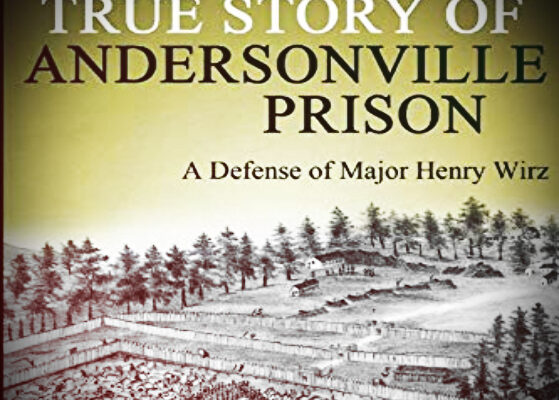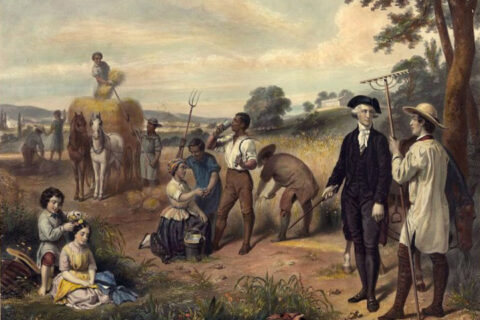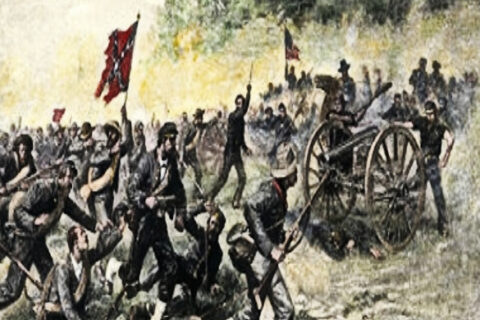As revealed in my last article, I have been spending a significant portion of my precious “free time” of late perusing the contents of the Confederate Veteran magazine. While thumbing through the May, 1908 edition of that long-forgotten publication recently, I happened upon an item announcing the then newly-released book curiously titled, The True Story of Andersonville Prison, A Defense of Major Henry Wirz, by James Madison Page. The advertisement itself was new to me no more than a couple of weeks ago; the book and its author, on the other hand, have been familiar and ready sources of reference to yours truly for several years running.
It so happens that I more or less accidentally discovered the Kindle version of Mr. Page’s book several years ago. “More or less,” I say, since one supposes such a discovery is not exactly accidental when he is actively asking, seeking, knocking – Matt. 7: 7-8. Regardless, Amazon helpfully informs me that I purchased the book on Jan. 15, 2020, and I’m in no immediate position nor frame of mind to argue the date if I would. Subject and subject matter being, as they then were and remain to this day, of intense interest to yours truly, I naturally made my purchase, whereupon I immediately began to read its pleasantly surprising fair and honest contents. With exception of a few necessary distractions interspersed throughout, my reading continued otherwise uninterrupted until I’d devoured the book in full sometime later in the “wee hours.”
Needless to say, I became an almost instant admirer of Mr. Page and his sober recollections of the not so “halcyon days” of his capture and imprisonment behind Confederate lines. And I further state, without hesitation or mental reservation, that I heartily recommend the book to ID readers, as well as to all who are sympathetic to the cause of Southern Nationalism. It is particularly recommended to young homeschooling and would-be homeschooling Southern parents resolved to strictly adhere to R. L. Dabney’s timeless admonishment that we “not allow the dominant party to teach [our children] a perverted history of the past contests.”
In the immediate years prior to adding Mr. Page’s book to my Andersonville repertoire, I had already somehow managed to slog my way through several separate first-hand testimonials of the subject and broader subject matter. These include John Ransom’s famous Andersonville diary, Lessel Long’s (lesser known) treatment of same, John McElroy’s embittered recollections as a “guest of rebel prison pens,” and at least two more by as many authors that I will exercise the privilege of not naming for the time being.
Be it known that my choice of phraseology in the opening sentence of the preceding paragraph is intended to convey the sense of ‘difficulty under duress’ with which a true Son of the South proud of a brave, a heroic – indeed, a magnanimous – ancestry unpleasantly, yet dutifully, grinds his way through page after page of slanderous Yankee invective intended to defame, defraud, and to anathematize his betters; of libel piled upon libel, of insult heaped atop insult; each successive one it seems crafted to surpass the vileness of the invective preceding it. To what other purpose, one strains his last nerve and the limits of his wit to divine or articulate.
The foregoing names combine to form a veritable “who’s who” amongst a certain type of Yankee chronicler whose inveterate scribblings, noted Dr. Dabney, “aim to falsify or misrepresent everything; the very facts of history, the principles of the former Constitution as admitted in the days of freedom by all statesmen of all parties; the characters and motives of our patriots; the purposes of parties; the very essential names of rights and virtues and vices.” Indeed, “the whole sway of their commercial and political ascendancy,” wrote Dr. Dabney, “is exerted to fill the South with this false literature.” I, of course, concur with those sentiments.
As for that latter chronicler alluded to (McElroy) – my sympathies regarding “rebel prison pens” and their overseers being unapologetically what they are – I find it extremely difficult to slog my way through his pages to this very day, even though I know all too well what to expect from perusing that author’s highly exaggerated, often bordering on unhinged, missives. The remaining titles mentioned aren’t much better if better at all in several notable respects. I must own nevertheless that there is something about Ransom’s semi-daily entries for example that allows my mind, in the spirit of fairness and of Christian forbearance, to make an exception in his case, and to thereby lend a somewhat sympathetic ear to him personally and to his story-telling that I simply find impossible with the others.
By way of explanation of what I just wrote, I have convinced myself that a big part of the reason is that the highly charged state of Ransom’s mind as he jotted down many of his offensive entries is perfectly understandable given the severity of the day-to-day trials and tribulations he and his comrades faced as he struggled to put in words what he and his “mess” were experiencing *in real time*. Add to that the fact that young Ransom, by his own oft-repeated admission throughout his memoirs, entered army life rather a weakling, utterly ill-prepared, by virtue of a pampered upbringing at home and the coddling of his formal educators alike during his formative years, to endure the extreme difficulties that were to be his unfortunate fate in 1864-5. One can sympathize with him in that way only because it of course was due to no fault of his own that his parents and guardians instilled in him a passionate hatred of the Southern nation on one hand, while simultaneously working in collusion to deprive him of a manly physique and mentally tough disposition on the other. In modern psychological terminology, it might be said of young Ransom that he likely suffered from at least a mild form of “castration anxiety,” of the metaphorical kind.
Whereas, and by contrast to 20 year-old Ransom, McElroy and Long were “inspired” to publish their bitter recollections fifteen and twenty years after the fact, when time enough had passed to begin the process of “healing all wounds”; time enough, moreover, for discretion to have become, by then, “the better part of valor.” And yet, though McElroy categorically denies the harboring of any residual resentment, ill-feeling or ill-will towards the South and the Southern people at the outset, the chapters which follow his introductory statements to the effect betray his true attitude towards all things Southern, past and present, especially those things Southern that yet remained “unreconstructed” at the time of his writing.
Notwithstanding any and all of the above, my purpose in this article is certainly not to dwell upon the likes of Ransom, Long, or McElroy et al; I mention them, one and all and to the extent I have, merely to provide context for my underlying purpose herein, which is simply to highlight and to promote Mr. Page’s book as eminently above them all in truth, in charity, and in magnanimity. My desire is that this article will inspire at least a few of you to purchase and to read it.
I have, so far, resisted the urge to quote from any of the foregoing titles, and certainly have no intention of copying the example set by The Veteran in reprinting an entire chapter of Mr. Page’s book, even if I believed our editor would permit it. It seems fitting, however, to sparingly quote from the book in closing and without further ado.
Regarding the above-mentioned insults and libels leveled by certain Northern writers against our Confederate ancestors of all ranks and stations, Mr. Page writes:
I relate the incident here to show how fair and honest these men were. I have read much about our prisoners being robbed of money, watches, jewelry, and clothing upon entering Libby, Belle Isle, Andersonville, Salisbury, and other prisons in the South, but as far as I personally was concerned, I can truthfully testify that neither at Libby, Belle Isle, Andersonville, nor Millen, where I was confined, were any articles taken from me. I had $20 when I entered Libby and Belle Isle, and $30 or $40 of Confederate money when I entered Andersonville, and not one penny was taken from me. The Confederate officers and men at Libby and Belle Isle also knew that I had a watch with me, for I made no secret of it. They did not demand it of me, though it was a valuable timepiece.
As to the ill-treatment and wanton cruelty captured Northern soldiers purportedly suffered at the hands of their “barbaric” Southern captors and overseers, our author writes in part:
Touching my treatment on the whole, I cannot recall a solitary instance, during the fourteen months while I was a prisoner, of being insulted, browbeaten, robbed, or maltreated in any manner by a Confederate officer or soldier. … With all respect to my late brethren-in-arms in prison life I cannot but think that to some extent they were instrumental, if they state facts, in bringing this treatment upon themselves.
It is noteworthy in light of the foregoing remarks that if you were to read the three authors I have named above, you would shortly conclude that whatever ill-treatment those men and many of their compatriots really received during prison life, they most certainly brought a great deal of it on themselves by virtue of their ill-tempered, insubordinate dispositions in captivity. Mr. Page backhandedly illustrates his point in the foregoing quotation by recounting a favorite Northern story of insolent Yankee behavior in the face of defeat and capture, to wit:
A detachment of Union soldiers were once surrounded and captured in a piece of timber. When they realized that it was all up with them the most of the battalion dropped their muskets, but one of the boys retained his until a rebel soldier was about to reach for it, whereupon the Federal sprang back, caught the musket near the muzzle in both hands, and swinging it over his head smashed it against a tree. “Now, damn you, pick up the pieces!” he ejaculated. “What execrable manners!” exclaimed Madame de Stael when Napoleon bluntly and in non-tea-table language refused to grant some political favor for which she importuned him. “It’s a pity that one so great was so badly brought up.”
The bravery and loyalty of the musket-destroying soldier was extolled in the North from “Dan to Beersheba,” and every town and hamlet between the two Portlands was made acquainted with the incident. If this soldier is alive today it is safe to say that he hasn’t got through recounting the abuse, insults, and misery that were heaped upon him while a prisoner in the South.
Nor does the book’s subtitle falsely advertise its defense of Captain Wirz. In so doing, Mr. Page calls on the carpet a number of writers for ‘playing fast and loose’ in their descriptions of principal persons and events forever associated with Andersonville. Among others, McElroy is specifically cited in several places for his fast and loose recollections, particularly as they directly involved Captain Wirz, his character, his alleged acts of cruelty and so on. A pet peeve of my own for several years in this vein is the demonstrably false, yet typical, portrayals (written and theatrical) of Captain Wirz as a crotchety old geezer, pissed off at all that is good in the world, and hell-bent on exacting revenge by inflicting the cruelest pain and suffering possible upon the hapless innocent victims under his charge. It is therefore fitting that I should close this article with a minute sampling of Mr. Page’s indignant thoughts concerning such depictions:
The descriptions given by others of Captain Wirz are so erroneous, misleading, and untrue that I will describe him as well as I can at this late day. He was of good height, perhaps five feet eight inches; slim in build, with a handsome face, aquiline nose, even features and a high forehead. His eyes were gray in color. At this time he wore a short, partially full beard. There was a quiet, subdued expression of sadness in his countenance, particularly in his eyes. There was nothing of that “short, thick-set Dutchman, repulsive in appearance, besotted, ignorant and cruel” we hear about, or of a countenance denoting “ferocity and brutality.” I have always marveled at the descriptions of this most unfortunate man given by those who often saw him.
RIP James Madison Page; RIP Major Henry Wirz;
God bless and save the Southland!







It’s great to see you back with an article on ID after such a protracted absence! It’s also good to see that the maligned characters in history have defenders, even from among those on the other side — though one wonders that they can find publishers.
Hans Schmidt comments in his account of WW2 on the fate of ‘Heinrich’ Wirz:
“[There’s] a quirk in the American character to view an enemy’s actions with unforgiving harshness, while at the same time explaining similar or worse actions by American soldiers with lame excuses, such as calling them “collateral damage”. p. 171.
It [also] seems to me that the major lessons regarding the treatment of prisoners, and how to deal with “enemy” populations, (lessons that seem ingrained in the psyche of the U.S. Armed Forces and other Washington authorities), stem from [this war]. A direct line of “Washington” behavior runs from the battlefields of Antietam and Atlanta to Germany and Vietnam, and now, to places like Waco, Whidbey Island and Ruby Ridge. Already, in 1865, they hung hapless Heinrich Wirz for his “crimes” at Andersonville, forgetting to even reprimand the Northern jailers who together caused many more deaths of Confederate POWs than he was accused of. As long as the bones of the victims remain hidden, no account is needed or desired by the U.S. political system. When fifty or a hundred years after the fact the truth comes out … the individual culprits are usually dead and the system is ready for the next charade as savior of mankind.” p. 330.
Hans Schmidt, ‘SS Panzergrenadier: A True Story of WW2’
Oy gevalt! Yesterday I wove a web of deceit so incredibly twisted I am now trapped in it myself! Someone save me!
The power of prayer… which we should apply ourselves to often, and with discipline:
https://citizenfitz09.blogspot.com/2011/05/mysterious-andersonville-spring.html
Always a pleasure to be enriched by your intellect brother. You dig deep into subjects that we all need to think through.
If Thomas Jackson had been listened to, Anderson and all other Southern prisons would have never existed. The Black flag !
This book and many others can be downloaded free at archive.org. Holybooks.com also has many free books.
This book and many others can be downloaded free at archive.org. Holybooks.com also has many free books.
A correction of a probable oversight:
The CONFEDERATE VETERAN magazine is alive and well. I can’t be sure but the “long-forgotten publication” referred to must be the – still – much lamented SOUTHERN PARTISAN magazine.